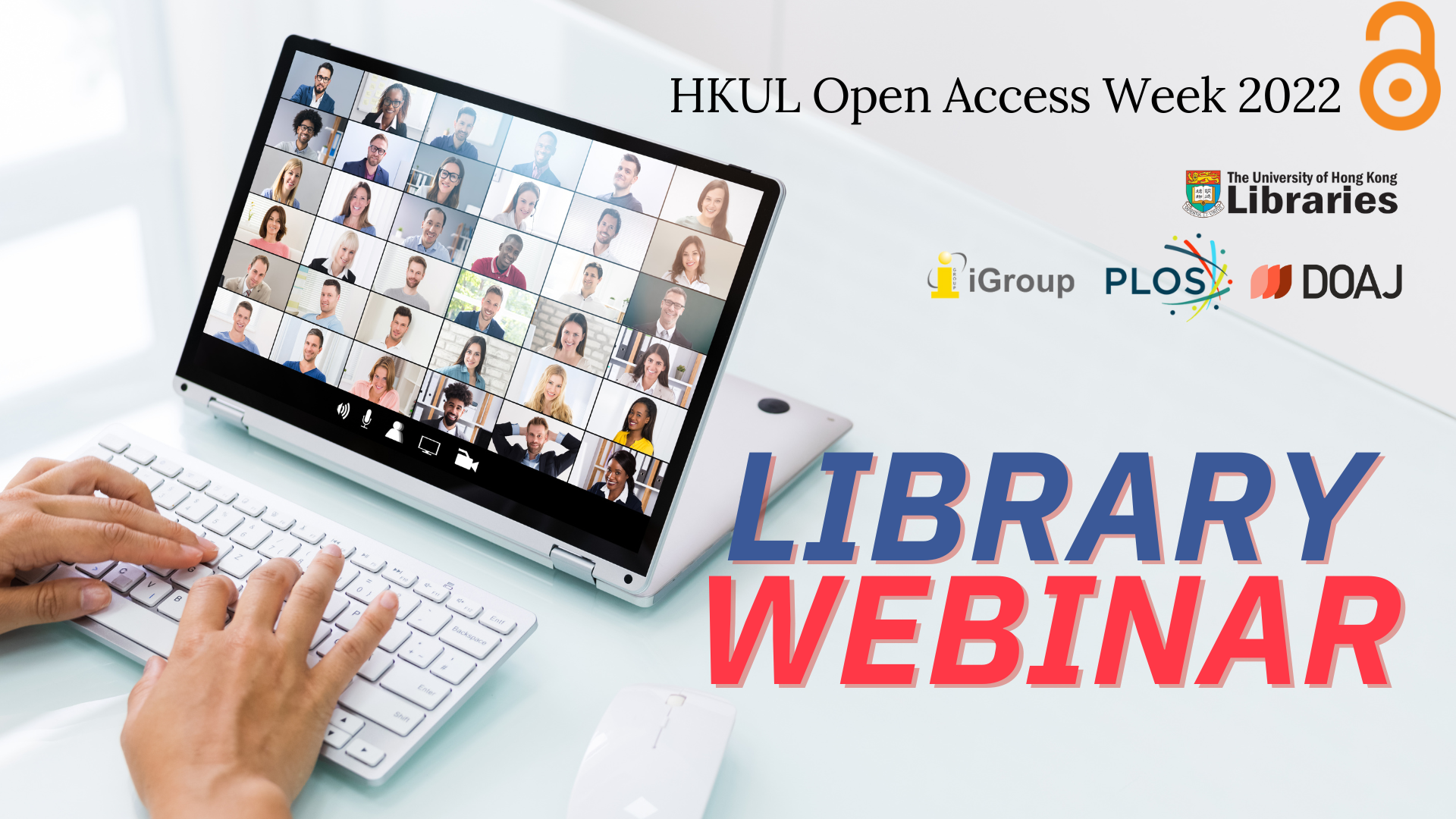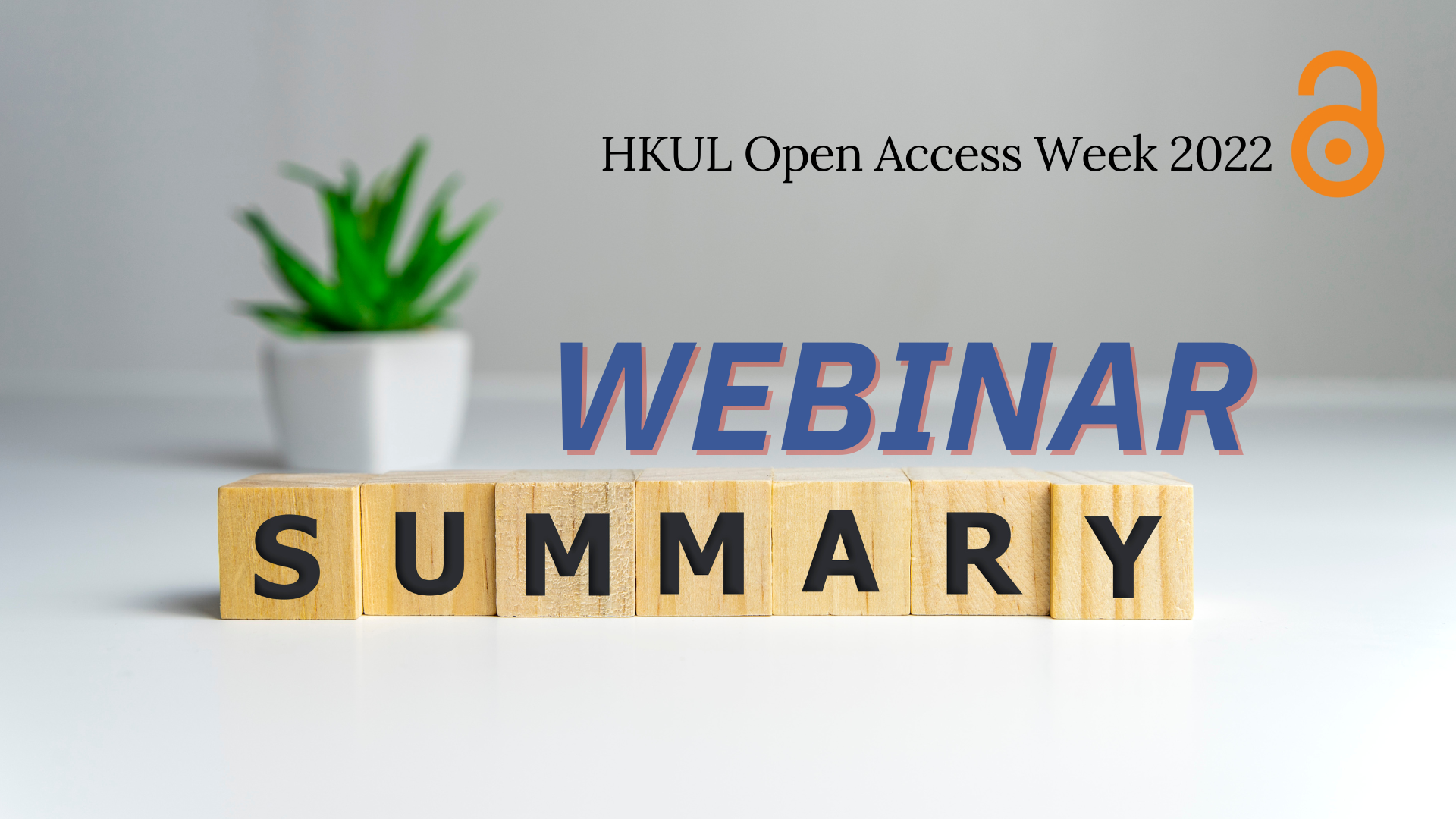
Open Science and Open Access Publishing Webinar 2022
The HKU Libraries is organizing a webinar regarding Open Science and Open Access Publishing on 28 October 2022 (Friday) from 2:00 p.m. to 4:00 p.m. (Hong Kong time). Guest speakers from iGroup Asia Pacific, PLOS, and DOAJ are invited to deliver speeches related to open sciences and best practices in open access publishing. The event will also be open to academic community members from the APAC region, which will provide opportunities for idea exchange and discussions with international participants within the region. Registration is now open at https://tinyurl.com/hkuloa2022.
This webinar comprises three sessions, and we are pleased to have our invited guest speakers from PLOS, DOAJ, and iGroup Asia Pacific to deliver speeches in each session respectively. Details of the sessions are listed as follows:
Session 1
Open science in practice through PLOS journals
Speaker: Ms. Elaine Tham (Regional Director, Publishing Development (Asia), PLOS)
Descriptions:
At PLOS, our mission is to accelerate progress in science and medicine by leading a transformation in research communication. Research is a global, collaborative enterprise, and we work closely with the community to publish more reliable, reusable and reproducible research. In this talk, I will cover core open science features such as open data, open code, preprints and registered reports, which have been incorporated into PLOS’s journal portfolio to help authors better verify, improve and share their research with a wider audience. I will also share some of our new business models that aim to support open access in a more sustainable and equitable way.
Talk outline:
• Introduction to PLOS and PLOS journals
• What is open science?
• Open science in practice through PLOS journals: open data, open code, preprints and registered reports
• Innovative business models to support open access
• Why publish with PLOS?
PLOS is an Open Access (OA) publisher supporting researchers to transform science towards Open Science. PLOS publishes a suite of Open Access journals across all areas of science and medicine, including PLOS ONE, PLOS Medicine, PLOS Genetics, etc. It offers a range of innovative Open Science options to enrich scientific records. In addition to OA articles, preprints, open data, and open methods are also supported at PLOS. Its flexibility in OA publishing has been engaging researchers. In the past 10 years, among the 22,623 OA publications produced at HKU, PLOS journals ranked the first with 914 publications.

*Data retrieved from InCites on 18-October-2022.
Session 2
Understanding best practice in open access publishing and DOAJ services
Speaker: Dr. Cenyu Shen (Quality Team Leader, DOAJ, DOAJ Ambassador for China)
Descriptions:
This session aims to provide an overview of what is best practice in open access publishing and give an introduction to DOAJ and our services. That includes, what DOAJ defines as open access and how DOAJ uses a set of criteria to evaluate the quality of open access journals. The last part will explain how researchers can use DOAJ to identify trusted open access journals to publish in.
DOAJ is a community-curated online directory that indexes and provides access to high quality, open access, peer-reviewed journals. The directory was established to ensure and increase the visibility, accessibility, reputation, usage and impact of quality open access scholarly journals globally. It is independent and financially supported by multiple academic organizations and contributors. By 2022, there are already 17,500 peer-reviewed open access journals indexed in DOAJ.
Session 3
Three things to know before O.A. publishing: channels, tools, and skills
Speaker: Dr. Woei Fuh Wong (Consulting Manager of iesResearch, iGroup Asia Pacific)
Descriptions:
Delving into the world of open access could open Pandora’s box full of questions. Why OA publishing, what are the differences, and how to do that right? Open Science offers practical ways to communicate science in a highly networked world where billions of people still have little or no access to advanced knowledge or technologies. O.A. publishing is one key ingredient. To the researcher, it is a faster means to share knowledge, seek collaboration, or even increase visibility-citations. Researchers must prepare themselves for publishing at the proper channels, utilize machine-learning tools (or A.I. tools), and adopt impact writing skills. This workshop will explore these three perspectives. The researchers will learn about their options for O.A. publishing, including the journal selection that no longer solely relies on Impact Factors. More importantly, the researchers could see some advanced machine-learning tools that assist them in paper reading and manuscript authoring. The session will conclude with tips on impact writing skills that researchers adopt for Impact Case Study, Plain Language Summary, and Social Media writing.
iGroup is a provider of academic information and resources, which actively assists the academic community to transform academic publishing towards new models.
Don’t miss the chance! Share it with your peers and register for the webinar now at https://tinyurl.com/hkuloa2022
For enquiries, please contact us at scholarlycomm@hku.hk


